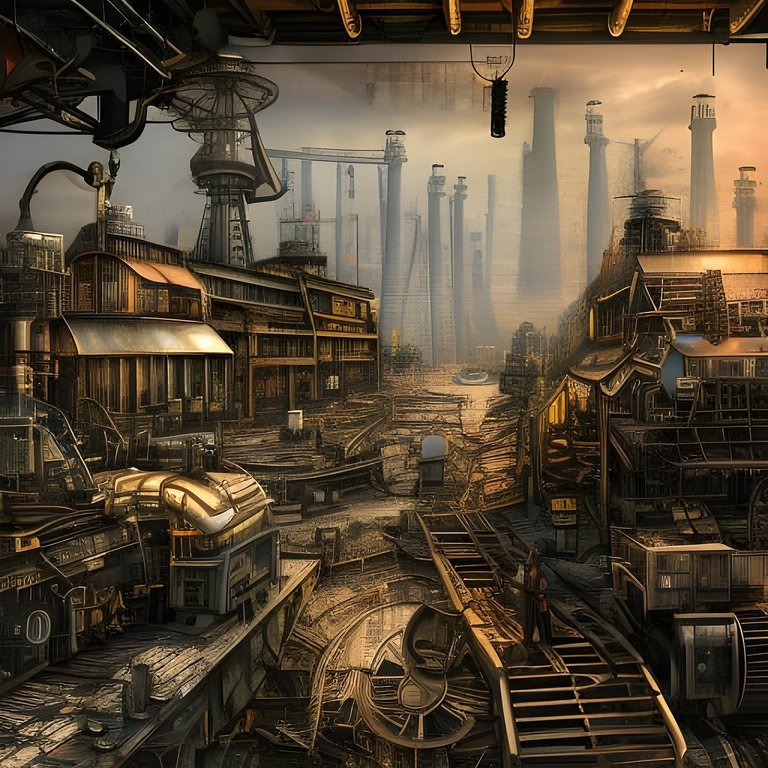
Everyone loses in a revolution. That's my assessment. Of course, none of us really believed in the revolution until my cousin, Baz-Baz Chinnelle, went missing. He always said he and Gina would get out before it started.
The mail from Yeginder had arrived. I retrieved Gina's packet after my night-shift and headed over to their place in The Lumps. A cold breeze blew up the Wyrnal canal and down my neck. I looked forward to a cup of chai and, if I was lucky, some of Gina's home-cured bacon on still-warm bread.
The first indication anything was wrong sat on their door-step. "Hey, Carradine, what you doing sitting in the cold?" I bent and stroked the overweight tabby. She meowed plaintively. I knocked the door. Carradine mewed again. I knocked louder.
When it remained unanswered I leaned an ear to the wood. A faint tinkle of wind-chimes was the only sound from inside. This was the first time I wondered if Baz-Baz's revolution might happen. Gina never missed the weekly packet of mail from back home, never. And they both doted over the fat cat who rubbed against my leg.
"C'mon, Carradine." I scooped the cat up and headed to my flat. Carradine didn't seem impressed, but a few chicken scraps and some milk mollified her.
If the revolution was coming, it seemed sensible to prepare. My tiny garret flat began to look like a store-room. Boxes of tins, jars, and bottles were stacked everywhere. I put a new lock on the door, and installed a sliding barrier behind that.
It was strange, though, I seemed to be the only one preparing. I said that none of us believed in the revolution until Baz-Baz and Gina disappeared. It was only me that believed. The others wrote him off as an ex-cadet with memories of hope, but no future other than the castles built in his mind.
"Gina's dragged him back to Yeginder," Jonas said. The others agreed.
"But, the revolution--"
Larra interrupted me. "Sar-Chona's always revolting."
Even I laughed at that. But no one else believed change was coming. No one. There was an ingrained expectation that The Inspectorate, Sar-Chona's security arm, would be on top of any situation. They had a reputation for having spies everywhere and were run by a woman whose name, Kelly Secnish, was a byword for ruthlessness. Doing a Kelly, or being Kellyed meant doing, or having done to you, very bad things.
Two weeks after Baz-Baz flew the coop Kelly was killed in a shoot out with one of the city's top businessmen. Things were quiet for two days, then hell broke out.
I holed up in my flat for nearly a week, watching the city burn, listening to murder and death from the street below, wishing Baz-Baz and Gina well wherever they had escaped to, and wondering why he hadn't warned us.
When I eventually ventured outside, Sar-Chona was no longer Sar-Chona.
I made my way through dark and quiet streets, assailed by putrefactions rankness. The water-pump still worked, something I'd worried about. Returning home safely with a flagon of fresh water was a relief.
Over the coming days my explorations lengthened. The factory I worked in was a charred ruin. One morning, near the remains of a barricade, I met Larra.
"Where's Jonas?" I asked.
Her face was pale beneath the grime. She shook her head. The expected tears never came. She came home with me and, after eating greedily, curled onto the bed and slept. Carradine snuggled against her in sympathy.
Two days later Larra could cry again. She told how Inspectorate forces cut Jonas down as he helped blockade the street, trying to keep back marauders and rioters.
"I never really believed there'd be a revolution," she said. "I thought Baz-Baz was spinning a yarn. He was full of them."
"This one was no story."
"No. Where do you think they are?"
"Somewhere safe, and warm."
We sat in silence. Everyone loses in a revolution. I'd been lucky to only lose a job I hated.
Normality, of a sort, returned though people were nervous to accept it. Change can be energizing, but here it was enervating. In the weeks after the revolution I didn't want to do anything. Larra wasn't in a fit state to.
Friends, work, the security of life's simple rhythms were gone. It was only slowly that city sounds began to return to a level of normality. The Chooner' Lane station once again rattled to mono-rail carriages arriving and leaving. Steam whistles from factories which hadn't been destroyed blew their calls to work.
Still, the streets were quiet when I made a regular check on Baz-Baz and Gina's place.
The door was open.
I unsheathed my knife and went in, hoping to find my friends, ready to attack looters.
"Who the hell are you?" The stranger asked. He was as tall as Baz-Baz, and about the same age. And he had a shock-flail pointed at me. It's charging chamber flickered and his finger curled round the trigger. My knife felt inadequate.
"This is my cousin's house," I said. "I'm watching it until he returns."
He shook his head. "They wont be." He put the gun down. In seconds he went from a dangerous looter to a sad-faced stranger with the demeanor of a lonely tree in a desert plain.
"What do you mean?"
"They're both dead."
"What?"
He shook his head, like it didn't matter.
"Tell me how," I demanded. The knife wavered in my hand. I gripped it firmly. "And who the hell are you?"
Gina's wind chimes tinkled softly.
"Does it matter. They're gone, and so are the people responsible."
Everybody loses in a revolution.
This flash story would fit late in the timeline of the novel. The MC doesn't appear in the novel, the cousin only appears as a cadaver, but the unnamed person at the end has an important role
text by stuartcturnbull, art by FreeFunArt via Pixabay




